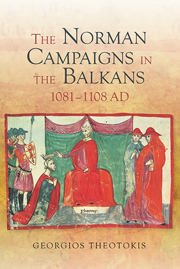Book contents
- Frontmatter
- Contents
- Acknowledgements
- List of abbreviations
- Map I Southern Italy and Sicily
- Map II The island of Sicily
- Map III The southern Balkan peninsula
- Genealogical table: The Norman dukes
- Dedications
- Introduction
- 1 Primary Sources and the Problems of Military History
- 2 Norman Military Institutions in Southern Italy in the Eleventh Century
- 3 The Byzantine Army of the Tenth and Eleventh Centuries
- 4 The Byzantine Naval Forces of the Tenth and Eleventh Centuries
- 5 The Establishment of the Normans in Southern Italy and Sicily
- 6 Robert Guiscard's Invasion of Illyria
- 7 The Norman Advances in the Balkans and the End of the Dream
- 8 Bohemond of Taranto and the First Crusade
- 9 The Count's Campaign of 1107 and the Treaty of Devol
- Conclusions
- List of Byzantine Emperors
- The Hauteville family
- Glossary
- Bibliography
- Index
6 - Robert Guiscard's Invasion of Illyria
Published online by Cambridge University Press: 05 October 2014
- Frontmatter
- Contents
- Acknowledgements
- List of abbreviations
- Map I Southern Italy and Sicily
- Map II The island of Sicily
- Map III The southern Balkan peninsula
- Genealogical table: The Norman dukes
- Dedications
- Introduction
- 1 Primary Sources and the Problems of Military History
- 2 Norman Military Institutions in Southern Italy in the Eleventh Century
- 3 The Byzantine Army of the Tenth and Eleventh Centuries
- 4 The Byzantine Naval Forces of the Tenth and Eleventh Centuries
- 5 The Establishment of the Normans in Southern Italy and Sicily
- 6 Robert Guiscard's Invasion of Illyria
- 7 The Norman Advances in the Balkans and the End of the Dream
- 8 Bohemond of Taranto and the First Crusade
- 9 The Count's Campaign of 1107 and the Treaty of Devol
- Conclusions
- List of Byzantine Emperors
- The Hauteville family
- Glossary
- Bibliography
- Index
Summary
Diplomatic relations in Italy on the eve of the invasion of Illyria
In order to elucidate the political and diplomatic significance of the conference at Ceprano (June 1080) that saw the reconciliation of the pope with the Norman leaders, I begin by giving a brief description of the papal–Norman relations in the age of Gregory VII (1073–85). Gregory, almost as soon as he was elected in the papal curia, became openly hostile towards the Normans, thus returning to the papal policy of the pre-1059 period, when the Normans were regarded as enemies of St Peter. During the years of the reformist papacy, and especially of Leo IX (1049–54), the growing numbers and political significance of the Normans in southern Italy compelled Rome to make a decision as to whether the Normans were potential allies to be recruited for pay, or dangerous enemies to be controlled, or even completely subdued. After Leo's election to the see of Rome in 1048, he and his successors chose the option of open hostility. What came to weigh on Rome's policies were the continuous inroads made by Norman troops into the Abruzzi area and specifically around Benevento, territories under papal overlordship since the summer of 1073. The protagonist of the Norman depredations in this area since the mid-1060s was Robert of Loritello, and although Robert Guiscard may not have been directly involved in the inroads, Robert of Loritello was after all the duke's nephew.
Relations with Rome, however, were not always hostile; in 1059, when Pope Nicolas II was in desperate need of political and military support against his rival John Mincio, cardinal bishop of Velletri (known as Benedict X), an alliance with Richard of Capua and Robert Guiscard seemed very attractive. Indeed, this was an alliance with both political and ecclesiastical repercussions for the region; after the treaty of Melfi, the Norman military muscle provided the necessary protection to the reformist papacy in its attempts to reassert its influence over the bishoprics of Apulia and Calabria. However, relations with the pope, although amicable, were not Guiscard’s priority throughout most of the 1060s because of his preoccupation with events in Apulia and Sicily; thus, he proved unable (or perhaps unwilling) to curb the territorial ambitions of his counts in the Abruzzi and the Roman Campania.
- Type
- Chapter
- Information
- The Norman Campaigns in the Balkans, 1081-1108 AD , pp. 137 - 164Publisher: Boydell & BrewerPrint publication year: 2014

